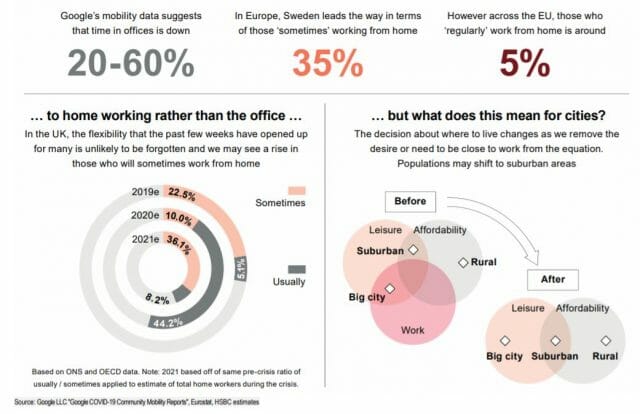The Covid-19 crisis is accelerating some trends that were already underway. For the past few years our research on cities in the developed world has been shaped around the gradual increase in home-working and what it will mean for the future of urbanisation.
Corporate announcements from the likes of Twitter suggest firms are more open to employees working from home even in a post-Covid-19 world. This only serves to accelerate a trend that was already underway.
In the decade to 2018, in many developed markets the share of home workers rose from roughly 10 percent to more than 20 percent. In the past couple of months this has likely risen to more than 45 percent.
With concerns over returning to busy offices and the discovery of some of the benefits of home-working to both workers and employers, some of this increase is likely to persist. However, we believe this is likely to be part-time rather than full-time working.
Will it mean the death of cities as we know them? If commutes are cut down from say five to two days a week, longer travel times are more likely to be accepted for a bigger home.
But surveys of urban inhabitants suggest that work is just one of the reasons people live in cities – and the greater availability of social, recreational and cultural activities is more important to some than a short commute.
This hasn’t changed, but we could see a more persistent shift towards suburbs and smaller towns and cities as the cost of living and quality of life is weighed up against access to these services.
Even if only a small share of workers change their habits, there will be economic implications.
First, we could see growth become more geographically diverse.
Second, we could see urban investment pick up as cities compete to attract residents from a newly geographically-mobile workforce. A key part of this will be making cities greener – more cycling, less congestion and pollution, and more open space.
Third, cities with high house prices could see prices dip relative to elsewhere. Fourthly, businesses that rely on commuters such as coffee shops and fast-casual dining could be hit.
Finally, a greater degree of working remotely could increase data processing and power needs, which is an issue that will have to be tackled.
Credit to HSBC Global Research









